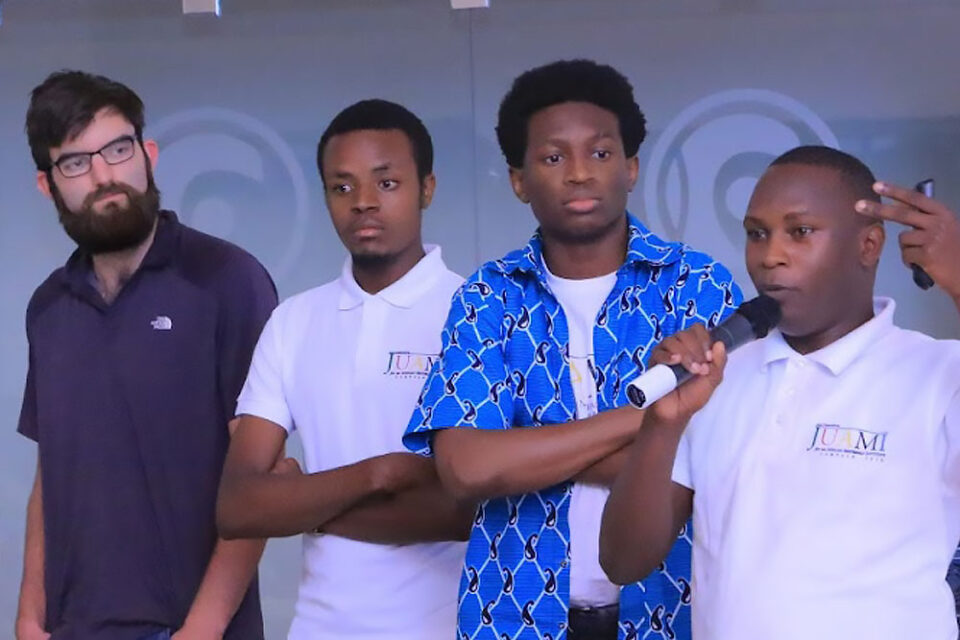Student-Led Project to Connect African and U.S. Materials Scientists Receives Google Award for Inclusion Research
November 24, 2021

Roughly 600 million people on the African continent live without reliable and stable access to electricity, clean water, and food. With rapidly growing populations, sub-Saharan nations need reliable and equitable access to energy to improve, and then sustain, their quality of life.
The majority of research efforts into energy generation, storage, and distribution occur outside of sub-Saharan Africa. Ideally, technological innovations in energy and sustainability intended to be implemented in African communities would be driven by local researchers and institutions, but fundamental, applied, experimental, and computational research efforts are currently limited by funding and infrastructure availability.
A student-led project involving groups at Columbia University, University of California, Berkeley, University of Michigan, Adama Science and Technology University, and Catholic University of Eastern Africa have received a $60,000 grant through the Google Award for Inclusion Research program. The grant will support efforts to connect African scientists to state-of-the-art computing tools for materials discovery and innovation on a free-to-access Google Cloud platform known as the Joint Undertaking for an African Materials Institute – Open Computing Facility (JUAMI-OCF).
JUAMI-OCF builds on a National Science Foundation-funded initiative to meet challenges related to reliable and sustainable energy in Africa. The open computing facility provides software critical to computational materials science and sustainability research, increases accessibility, and offers higher computational power than is typically available to graduate students on the African continent.
The project team is composed of students—Jaylyn C. Umana, Columbia University; Brian Iezzi and Muhammad Abdullah, University of Michigan; Kwasi Amofa, University of California, Berkeley—and professors—Simon Billinge, Columbia University; Dinsefa Mensur, Adama Science and Technology University; and James Sifuna, Catholic University of Eastern Africa.
Their proposal, “Developing Accessible Educational and Research Resources for East African Graduate Students in Computational Materials Science and Sustainability,” is aimed at the development of accessible Density Functional Theory (DFT) capabilities to empower a pan-continental community of independent materials and sustainability researchers.
DFT uses materials’ crystal structure to predict properties prior to costly and uncertain synthesis procedures. The electronic structure calculations also require significant computational resources and expertise that are not universally available, especially on the African continent.
The funds from Google Research will be used to build accessible onboarding tools for meaningful DFT calculations, organize educational workshops on the use of the tool, and foster a collaborative U.S. and East African community of DFT users.
“I feel that with the opportunity this funding from Google lays before us, I can realize my vision of building capabilities for a group of folks who I know are genuinely excited to get acquainted with DFT in a similar way that I was when I was first starting out,” Umana said.
JUAMI-OCF also aims to serve as a model for a larger East African computational research center and equip African student researchers with competitive, translatable skills, including Python, life cycle assessment, and density functional theory, for the industrial and academic job market. The platform will be leveraged to build sustainable and influential partnerships for faculty, student educators, and researchers.
“Our short-term goal will be to train three postgraduate students at Adama with the JUAMI-OCF team and facility to acquire the necessary computational skills and knowledge to screen potential electronic materials for photovoltaic applications,” said Mensur, who is a professor of materials science and engineering at Adama Science and Technology University in Ethiopia. “In the long-term, we want to establish a computational materials science and sustainability program covering all of East Africa.”
The team will also organize a mini-symposium to establish collaborations and foster networking with researchers in East Africa and the U.S.